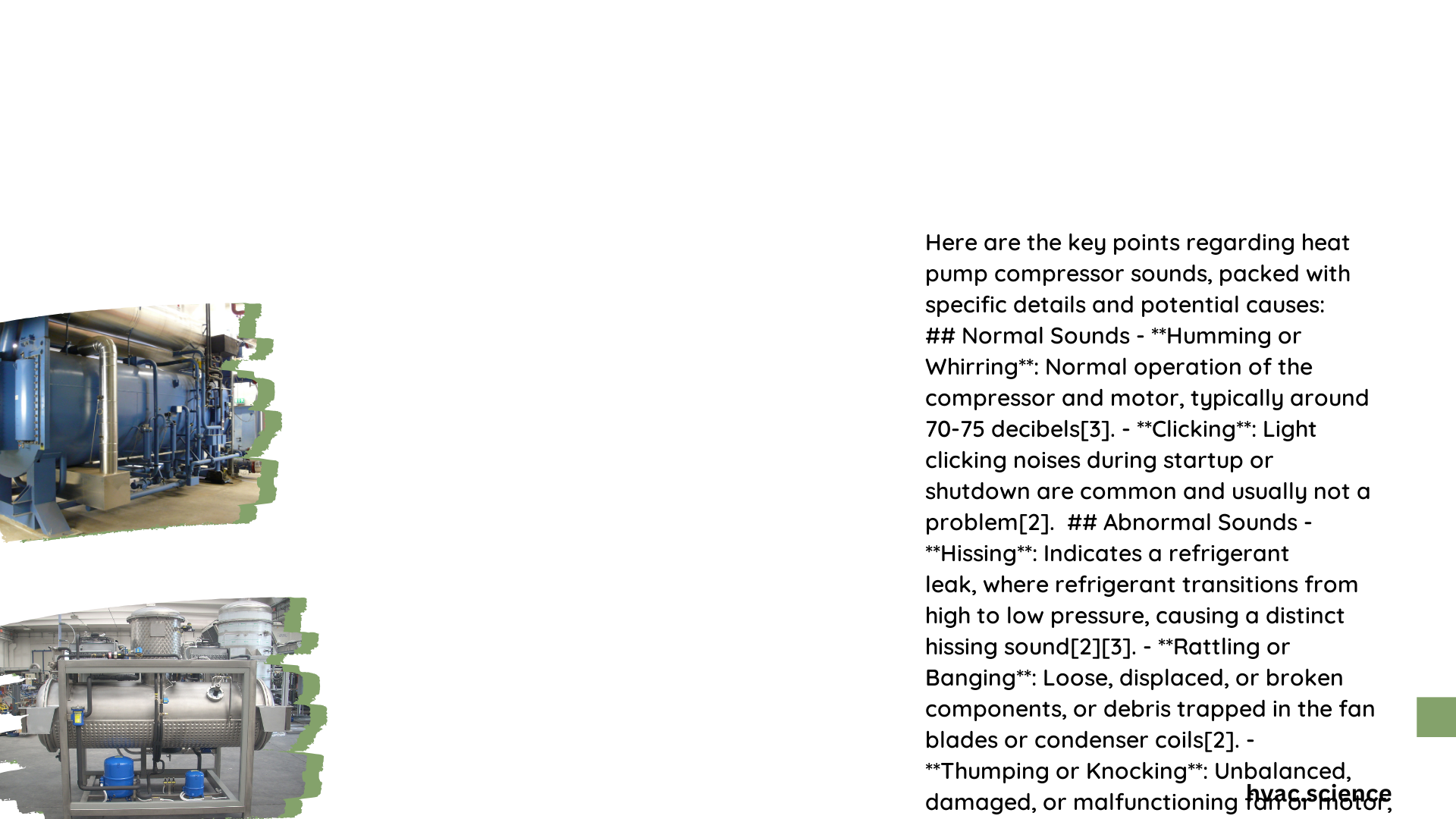Heat pump compressor sounds can range from subtle background noise to alarming mechanical disturbances. Understanding these sounds is crucial for homeowners to maintain system efficiency, prevent potential damage, and ensure optimal performance. From standard operational noise levels to diagnostic insights, this comprehensive guide will help you decode and address heat pump compressor sounds with expert precision.
What Are Normal Heat Pump Compressor Sounds?
How Loud Should a Heat Pump Compressor Be?
Heat pump compressors typically produce noise levels between 40 to 60 decibels during normal operation. To put this into perspective:
| Noise Level | Comparative Sound | System Condition |
|---|---|---|
| 40 dB | Quiet library | Extremely quiet operation |
| 50 dB | Normal conversation | Standard performance |
| 60 dB | Restaurant background noise | Older or larger units |
What Causes Standard Operational Sounds?
Several factors contribute to heat pump compressor sounds:
- Refrigerant Circulation: The movement of refrigerant through the system creates subtle humming
- Mechanical Components: Fans, motors, and compressor mechanisms generate operational noise
- Vibration: Normal system vibrations produce background sounds
How to Identify Abnormal Heat Pump Compressor Sounds?

What Do Different Sounds Indicate?
Homeowners should pay attention to these specific sounds:
- Rattling Sounds
- Potential Causes:
- Loose mounting components
- Unbalanced system
- Debris in the unit
-
Recommended Action: Immediate professional inspection
-
Grinding Noises
- Potential Causes:
- Worn bearings
- Damaged internal components
- Lack of lubrication
-
Recommended Action: Urgent professional maintenance
-
Whistling Sounds
- Potential Causes:
- Ductwork restrictions
- Refrigerant leaks
- Airflow obstructions
- Recommended Action: Comprehensive system evaluation
How Can You Troubleshoot Heat Pump Compressor Sounds?
Diagnostic Checklist for Homeowners
Essential Inspection Steps:
- [ ] Check external unit mounting
- [ ] Inspect for visible component damage
- [ ] Clean or replace air filters
- [ ] Listen for specific sound characteristics
- [ ] Measure noise levels with decibel meter
Professional Diagnostic Tools
Professionals use specialized equipment to diagnose heat pump compressor sounds:
- Ultrasonic leak detectors
- Vibration analysis tools
- Thermal imaging cameras
- Advanced multimeters
What Are the Potential Consequences of Ignoring Unusual Sounds?
Impact on System Performance
Unaddressed heat pump compressor sounds can lead to:
- Efficiency Reduction: Up to 25% decreased performance
- Energy Consumption Increase: Higher electricity bills
- Premature Component Failure: Potential complete system breakdown
Maintenance Recommendations
Proactive Sound Management Strategies
- Schedule bi-annual professional inspections
- Replace filters regularly
- Keep external unit clear of debris
- Address sounds immediately
- Maintain consistent system lubrication
Technical Insights
Sound Generation Mechanics
Heat pump compressor sounds originate from:
– Mechanical compression processes
– Refrigerant phase transitions
– Electrical motor operations
– Structural vibrations
Expert Recommendations
Best Practices for Sound Management
- Install sound-dampening materials
- Choose modern, low-noise heat pump models
- Ensure professional installation
- Maintain consistent maintenance schedule
Conclusion
Understanding heat pump compressor sounds requires a combination of technical knowledge and attentive listening. By recognizing normal operational sounds and quickly identifying potential issues, homeowners can maintain system efficiency and prevent costly repairs.
Key Takeaways
- Normal sounds range 40-60 dB
- Unusual sounds require immediate attention
- Regular maintenance prevents major issues
Reference:
– Heat Pump Noise Guidelines
– HVAC Maintenance Standards
– Residential Heat Pump Efficiency
